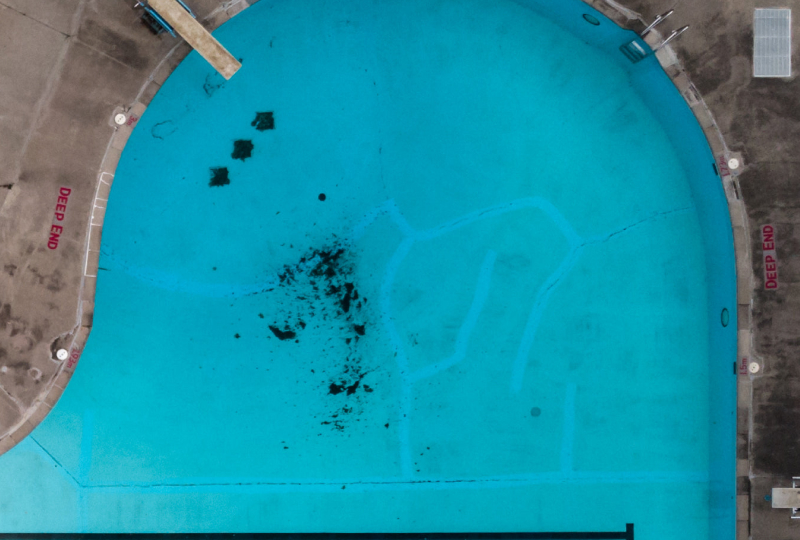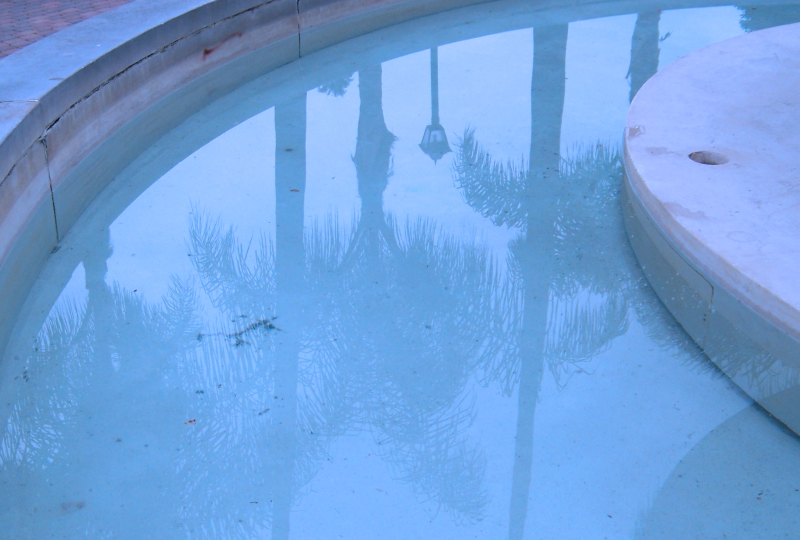
Stains in the Pool
Two main types of pool stains can occur: organic and metal. Correctly identifying pool stains and knowing how to clean them effectively will help make their removal easier.
Jump To Section:
Causes and Types of Stains in Pools
Identifying Stains in Pools
Cleaning Stains in Pools
How to Get Rid of Organic Pool Stains
How to Get Rid of Metal or Rust-Based Pool Stains
Preventing Stains in Pools
Causes And Types Of Stains In Pools
Organic and metal stains are two main types of pool stains which have various causes:
Metal or Rust-Based Stains: Potential causes include corrosion of metal pipes in your water system, copper algaecides, metal objects left in the pool, rusted metal accessories, parts, and equipment, and improper pH levels. Acidic (low pH) water will corrode copper and other metals, whereas alkaline (high pH) pool water will take the metals out of the solution.
Organic Pool Stains: Potential causes include outdoor materials such as leaves, berries, branches, insects, algae, and bodily oils.
Identifying Stains In Pools
To determine how to get rid of pool stains, you must first identify the type of stain that’s present – organic or metal/rust-based. Pool staining comes in various colours:
1. Greenish-Brown Stains: Likely caused by organic matter, including leaves or plant matter.
2. Reddish-Blue Stains: Likely caused by berries with intense colouring in nearby trees or bushes.
3. Blueish-Greenish-Black Stains: Caused by organic matter, copper-based algaecides, or copper from your well water or plumbing system.
4. Greenish-Brownish-Red Stains: Iron stains in pool water are likely caused by well water with high iron content or rusty iron fencing around your pool. When it rains, rust can enter your pool water and result in staining.
5. Brownish-Blackish-Purple Stains: Likely caused by manganese, a naturally occurring metal in well and municipal water.
If you still can’t determine what type of stain you’re dealing with, you can complete a simple experiment. First, apply a small amount of chlorine directly to the stain, then watch to see if the stain removes easily. If it does, your stain is usually from an organic cause. These types of stains are easier to remove.
If you suspect you have a metal stain in your pool water, apply ascorbic acid (or crushed Vitamin C tablets) to the stain, then scrub. If the stain is removed or lightens, then a metal cause is confirmed.

Cleaning Stains In Pools
To prevent the formation of pink slime in pool water, follow the steps below:
How to Get Rid of Organic Pool Stains
1. Clean Organic Debris off of Pool Surface
Use a pool net to remove leaves and debris from the top of your pool. To remove organic waste from the bottom of your pool, use a hand-held vacuum or an automatic pool vacuum that uses a sensor.
2. Test and Balance Your Pool Water
Test your pool water and balance your pool chemicals as necessary.
3. Perform a Shock Treatment
If there is minimal staining, brush chlorine directly onto the stain(s).
Complete a triple shock treatment by adding 3 pounds of pool shock per 10,000 gallons of water for multiple or significant stains.
4. Brush the Pool’s Surfaces
Identify any pool stains you want to eliminate and brush them until they disappear.
5. Operate Your Pool Pump, then Brush Again
Turn on your pool pump to filter out the dirty water. Keep it running for at least eight hours, then complete a second round of brushing to ensure the stains recede entirely.
If the stains are still present, complete the entire process again.
How to Get Rid of Metal or Rust-Based Pool Stains
1. Turn Off Pool Equipment
Turn off any chlorinators, metal ionizers, UV systems, and ozone generators.
2. Lower Your Chlorine Levels
Lower your chlorine levels to 0ppm by either partially draining your pool and refilling it with fresh water or using a chlorine neutralizer. The lower the chlorine level is, the less ascorbic acid will be necessary to clean the metal stain in pool water.
3. Apply an Algaecide Treatment
Follow the manufacturer’s directions to add a copper-free algaecide to your pool water. This will help prevent algae from blooming in pool water with lowered chlorine levels.
4. Rub Vitamin C or Ascorbic Acid Onto Stains
Rub a crushed-up Vitamin C tablet on mild stains. For larger metal pool stains, combine a half-pound of ascorbic acid for every 10,000 gallons of pool water. Sprinkle the pool stain remover evenly on the pool surface.
5. Operate Your Pool Pump
Turn on your pool pump to circulate the pool stain remover throughout your pool water. Keep your pump running for at least half an hour.
6. Recheck for Stains
If metal stains are still present, complete steps 4-5 again.
7. Test and Rebalance Your Pool Water
Test your pool water and balance your pool chemicals as necessary.
8. Turn Pool Equipment Back On
Turn any pool equipment back on that was powered off. Put a new metal eliminator pack in your pool skimmer basket. This will assist in keeping metal levels down and avoiding staining during the rest of the pool season.

Preventing Stains In Pools
1. Keep Your Water Levels Balanced
Follow a regular pool maintenance routine to maintain ideal chemical balances, especially alkalinity, pH, and sanitizer levels. A low pH can create acidic water, which can corrode and eventually oxidize the copper, resulting in copper pool stains. A high pH can force existing metals in the water out of the solution, which can cause scale and stains.
2. Keep Your Pool Clean
Skim and brush your pool 2-3 times per week to remove organic debris before it has a chance to sink to the bottom and stain surfaces. Vacuum your pool weekly to remove debris from the pool bottom.
Use a durable pool cover when you are not using your pool. Complete weekly shock treatments and regularly scrub the pool’s surfaces.
Maintain your pool plumbing system. If your system uses copper, replace any corroded pipes when necessary.
3. Test for Metal Contents
Monitor your water’s metal levels every week. Use a hose filter when filling or refilling your pool if your water source has metals.
4. Treat Stains Quickly
Inspect your pool regularly for stains and treat them as soon as you find them.
5. Use a Metal Prevention Product
Use either a sequestering agent (which floats free in the water) or a disposable absorbent bag (placed in your skimmer basket) to prevent metallic stains from returning.
